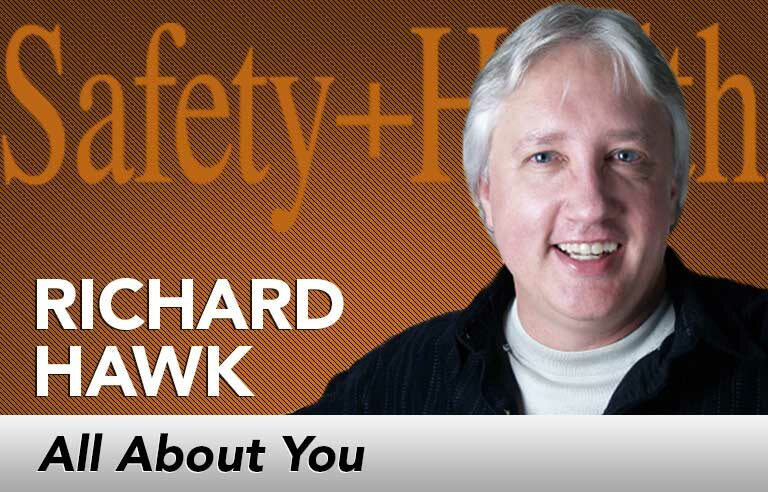All About You: Reacting to – and handling – excuses

EDITOR’S NOTE: Motivating employees to work safely is part of the safety professional’s job. But who motivates the motivator? In this monthly column, veteran safety pro and professional speaker Richard Hawk offers his entertaining brand of wisdom to inspire safety pros to perform at their best.
“It wasn’t my fault!”
How many times have you heard someone say that? If you’ve conducted incident investigations, no doubt it’s been in the mix of responses you’ve received during interviews. Often, what comes next is “an attempt to lessen the blame attaching to a fault or offense” – in other words, an excuse.
Everyone has to put up with excuses. However, as safety professionals, we tend to hear them more than most. I know I did when I was a full-time safety supervisor. Usually, it didn’t bother me, but sometimes I would get frustrated because it felt like a reflection of my influence as a leader if I “caught” employees not following safety procedures.
Reacting to and handling other people’s excuses for their actions can be tough – if you let it bother you. When I’m confronted with excuses, I consider three things:
- Even if the excuse isn’t true, the person may believe what he or she is telling you is a reason for the misdeed or for not doing something required.
- Taking it personally won’t help the situation.
- I make excuses, too – often to myself. In fact, the excuses that hold me back the most are the ones that I silently make for things such as not meeting a standard I’ve set for myself or being lax in pursuing a goal.
It can be unpleasant to admit we’re at fault, because it means we were responsible for what happened. That’s why the ancient German proverb “No one sees his own faults” is still true today.
It all boils down to the psychological phrase “locus of control,” which is how much you think you’re responsible for your performance and situations. If your locus of control is mostly external, you typically will blame other people and circumstances for things that don’t work out the way you hoped. This encourages excuses.
On the other hand, if your locus of control is mostly internal, you’ll tend to take responsibility for your behavior – whether it creates wins or losses.
Here are two mental techniques I use to help strengthen my internal locus of control that may help you, as well:
Tell yourself, ‘I do have the time!’
“I do have the time to …!” Fill in the blank with one of your goals or a lifelong dream. Thinking you don’t have the time to do something is a common excuse. So turn it around and find the time. It’s there, even if it takes some sacrificing to get it.
One of my favorite examples of finding time for your dream comes from New York Times best-selling author John Grisham. As a full-time lawyer, Grisham would get up at 4 a.m. to write for two hours before he had to go to work. Still further, he told an interviewer for USA Today that, “If I had 30 minutes or an hour, I would sneak up to the old library, hide behind the law books and write ‘A Time to Kill.’”
You do have the time to pursue your dreams, no matter what your age or circumstances. Sure, you may have to make some adjustments, like going to bed and getting up a bit earlier. Perhaps you could cut down on your screen time.
“Time waits for no one,” so use it to your advantage now.
Realize it’s OK to make mistakes
I regularly remind myself that it’s OK to make mistakes. I used to beat myself up anytime I made a mistake during a talk, even though I would try to blame it on something outside of myself, like “the audience was miserable,” “the sound was lousy” or “I had jet lag.”
Now, instead of casting blame outside of myself, I use my internal locus of control and ask, “What could I have done to improve what happened?” Then I remind myself that all of us make mistakes. However, if you take responsibility for them, they can help you grow.
This article represents the views of the author and should not be construed as a National Safety Council endorsement.
Richard Hawk helps companies around the world create more vibrant safety cultures by showing them how to make safety fun. As a professional speaker, author and musician, he also inspires employees to focus better and enlightens safety leaders about ways to increase their influence. To learn more about Richard, visit makesafetyfun.com.
Direct to your inbox: Sign up to be notified in email about new "All About You" columns.
Listen on Soundcloud or Stitcher
Post a comment to this article
Safety+Health welcomes comments that promote respectful dialogue. Please stay on topic. Comments that contain personal attacks, profanity or abusive language – or those aggressively promoting products or services – will be removed. We reserve the right to determine which comments violate our comment policy. (Anonymous comments are welcome; merely skip the “name” field in the comment box. An email address is required but will not be included with your comment.)

